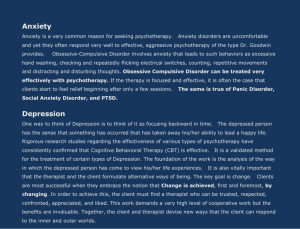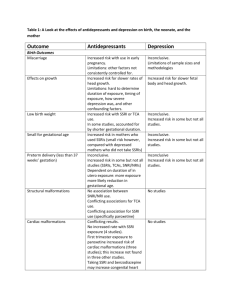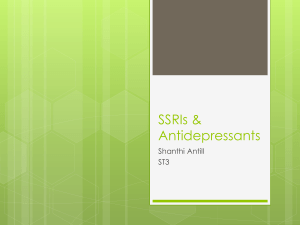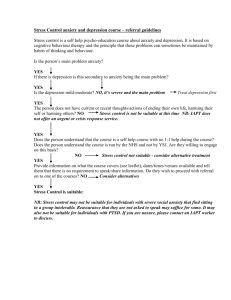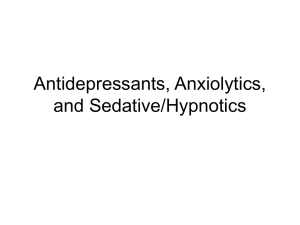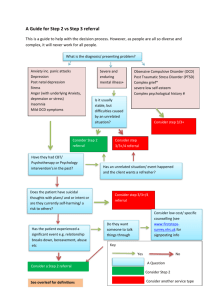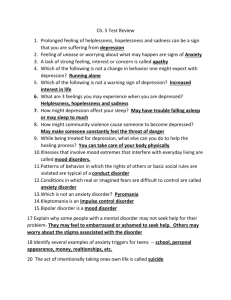Selective Serotonin Reuptake Inhibitors (SSRIs) include fluoxetine
advertisement
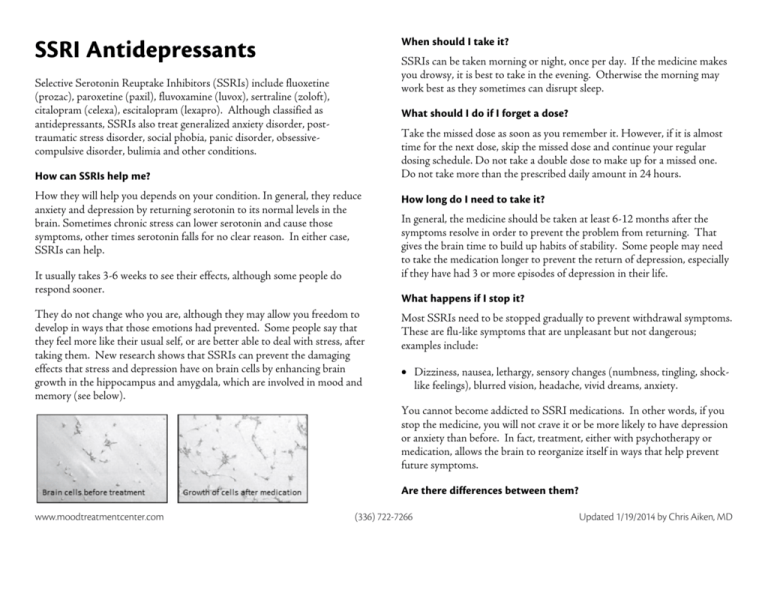
When should I take it? SSRIs can be taken morning or night, once per day. If the medicine makes you drowsy, it is best to take in the evening. Otherwise the morning may work best as they sometimes can disrupt sleep. Selective Serotonin Reuptake Inhibitors (SSRIs) include fluoxetine (prozac), paroxetine (paxil), fluvoxamine (luvox), sertraline (zoloft), citalopram (celexa), escitalopram (lexapro). Although classified as antidepressants, SSRIs also treat generalized anxiety disorder, posttraumatic stress disorder, social phobia, panic disorder, obsessivecompulsive disorder, bulimia and other conditions. What should I do if I forget a dose? Take the missed dose as soon as you remember it. However, if it is almost time for the next dose, skip the missed dose and continue your regular dosing schedule. Do not take a double dose to make up for a missed one. Do not take more than the prescribed daily amount in 24 hours. How can SSRIs help me? How they will help you depends on your condition. In general, they reduce anxiety and depression by returning serotonin to its normal levels in the brain. Sometimes chronic stress can lower serotonin and cause those symptoms, other times serotonin falls for no clear reason. In either case, SSRIs can help. It usually takes 3-6 weeks to see their effects, although some people do respond sooner. How long do I need to take it? In general, the medicine should be taken at least 6-12 months after the symptoms resolve in order to prevent the problem from returning. That gives the brain time to build up habits of stability. Some people may need to take the medication longer to prevent the return of depression, especially if they have had 3 or more episodes of depression in their life. What happens if I stop it? They do not change who you are, although they may allow you freedom to develop in ways that those emotions had prevented. Some people say that they feel more like their usual self, or are better able to deal with stress, after taking them. New research shows that SSRIs can prevent the damaging effects that stress and depression have on brain cells by enhancing brain growth in the hippocampus and amygdala, which are involved in mood and memory (see below). Most SSRIs need to be stopped gradually to prevent withdrawal symptoms. These are flu-like symptoms that are unpleasant but not dangerous; examples include: Dizziness, nausea, lethargy, sensory changes (numbness, tingling, shocklike feelings), blurred vision, headache, vivid dreams, anxiety. You cannot become addicted to SSRI medications. In other words, if you stop the medicine, you will not crave it or be more likely to have depression or anxiety than before. In fact, treatment, either with psychotherapy or medication, allows the brain to reorganize itself in ways that help prevent future symptoms. Are there differences between them? www.moodtreatmentcenter.com (336) 722-7266 Updated 1/19/2014 by Chris Aiken, MD Most evidence suggests that all SSRIs are equally effective for the conditions mentioned above. Although it is difficult to predict which SSRI is best for you in advance, it is known that if you do not respond to or cannot tolerate one SSRI a switch to a different one may still help. There are a few important differences among them. Fluoxetine leaves the body slowly (over several weeks) so has no withdrawal syndrome; it is also available as a weekly tablet. Paroxetine and fluvoxamine leave the quickest and have the greatest risk of causing withdrawal symptoms. Paroxetine and fluvoxamine are also available in extended-release (ER) forms which may slightly improve their side effects but do not reduce the withdrawal symptoms. Citalopram and escitalopram both contain the same chemical, but it is more concentrated in the escitalopram form. The SSRIs also differ in how they interact with other medications you may be taking. Can they cause harm? SSRIs may worsen certain psychiatric conditions, such as bipolar disorders (“manic-depression”). If you notice these signs while taking them, call me: > Feeling hyper, irritable, speeded up, giddy or “too happy”; decreased need for sleep, paranoid feelings, racing thoughts, high anxiety, talking fast. The following side effects may persist and can be treated or will go away if the medicine is stopped: Decreased sex drive, delayed orgasm, tiredness or low motivation. SSRIs have mild blood-thinning effects, so you may notice increased menstrual flow or other bleeding. You may need to stop them if you undergo surgery. The following side effects indicate that the medicine may need to be stopped; call me if they occur: Agitation, intense mood swings, racing thoughts, insomnia, restless feelings like you can’t stop moving. Serotonin Syndrome: this condition is very rare with SSRIs but can be more common if they are taken with other antidepressants or with lithium, tryptophan, buspar, or St. John’s Wort. It is caused by too much serotonin in the brain. Symptoms include fever, muscle jerks, diarrhea, sweats, racing heart, stomach pain, confusion and mood swings. If this occurs, stop the medication and call me or go to your local emergency room. An allergic reaction is possible with any medication. Symptoms include the following; stop the medication and call me if these occur: Pounding heartbeat; swelling of the face, throat, tongue, lips, eyes, hands, feet, ankles, or lower legs; hoarseness; difficulty swallowing or breathing; hives; rash. All SSRIs may decrease bone strength in post-menopausal women. People may also feel worse on SSRIs because of side effects (see below). For example, although SSRIs usually relieve anxiety, anxiety is also a rare side effect. Citalopram may increase the risk of heart arrhythmias at doses of 60mg and above. What side effects can I expect? Paroxetine may make your skin sensitive to sunburn. The following side effects are usually mild and often improve over time: Nausea, vomiting, constipation, diarrhea, stomach distress, dry mouth, dizziness, headache, palpitations, tingling or numbness, sweating, drowsiness, vivid dreams, anxiety, yawning, blurred vision. Interactions www.moodtreatmentcenter.com Recreational drugs: Although alcohol does not have dangerous interactions with SSRIs, drinking too much can prevent them from working. Recreational drugs can also prevent them from working. (336) 722-7266 Updated 1/19/2014 by Chris Aiken, MD Over the counter medicines: Do not take Saint John’s Wort with SSRIs; this can cause Serotonin Syndrome (see above) and other interactions. 12/30/1991 Prescribed medications: Do not take MAOI antidepressants (phenelzine, nardil, tranylcypromine, parnate, isocarboxazid, marplan, procarbazine, matulane, selegiline, eldepryl) with SSRIs. Other medication interactions vary for each SSRI; talk to me or check with your pharmacist about other medicines you are taking. Paroxetine (paxil, brisdelle, pexeva) How to store and dispose of medication Released 12/29/1992 Keep out of the reach of children. Store away from heat, direct light and damp places. To safely dispose of unwanted pills: Do not pour in the toilet or sink (it will enter the water supply). To prevent children or pets from eating it, mix unwanted pills in a bag with a little water and inedible trash (such as coffee grounds or kitty litter) and throw in the trash. Quick facts Sizes Fluoxetine (prozac, sarafem) > Tabs: 10, 20, 60mg > Caps: 10, 20, 40mg > Weekly: 90mg Depression in adults and children (20-40mg/d) OCD (40-80mg/d) Panic disorder (20-60mg/d) Premenstrual dysphoric disorder (20mg/d) Bulimia (60mg/d) > Tabs: 25, 50, 100mg > Liquid: 20mg/ml Depression (50-100mg/d) OCD (100-300mg/d) Panic disorder (100-200mg/d) PTSD (50-100mg/d) Sertraline (zoloft) Released www.moodtreatmentcenter.com > Tabs: 10, 20, 30, 40mg > Caps: 7.5mg (brand only) > XR: 12.5, 25, 37.5mg > Liquid: 10mg/5nl Depression (20-40mg/d) Generalized anxiety (20-60mg/d) OCD (40-60mg/d) Panic disorder (20-75mg/d) PTSD (20-60mg/d) Social anxiety (20-60mg/d) Premenstrual dysphoric disorder (20mg/d) Vasomotor symptoms of menopause (7.5mg/d) > Tabs: 25, 50, 100mg > ER: 100, 150mg OCD in adults and children (100300mg/d) > Tabs: 10, 20, 40mg > Liquid: 10mg/5ml Depression (20-40mg/d) Note: doses beyond 40mg/d may cause heart arrhythmias Released 12/5/1994 Generic (brand) Released 12/29/1987 Fluvoxamine (luvox) Social anxiety (100-200mg/d) Premenstrual dysphoric disorder (25-100mg/d) FDA Approval, Typical doses Citalopram (celexa) Released 7/17/1998 Escitalopram > Tabs: 5, 10, 20mg (lexapro) > Liquid: 5mg/5ml Depression (10-20mg/d) Generalized anxiety (10-20mg/d) Released 8/14/2002 (336) 722-7266 Updated 1/19/2014 by Chris Aiken, MD
